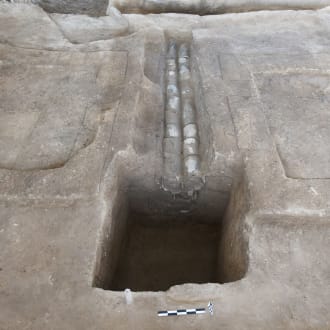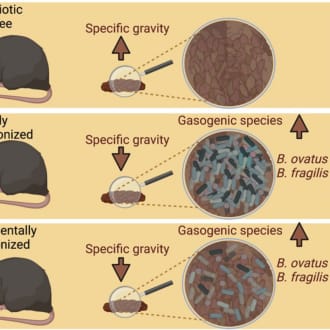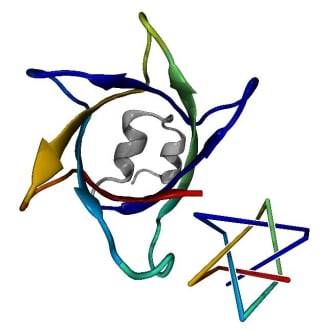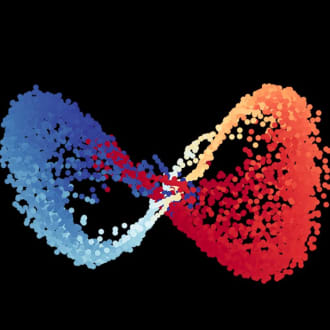The Best of Phys.org
10+ most popular Phys.org articles, as voted by our community.
Phys.org on Aging
Consortium to map senescent cells and their effect on aging and human health
Multiple researchers at the Jackson Laboratory (JAX) are taking part in an ambitious research program spanning several top research institutions to study senescent cells. Senescent cells stop dividing…
Phys.org on Chemistry
A new way to identify chiral molecules with light could vastly improve detection efficiency
Chiral molecules are those that have two versions that are mirror images, like our right and left hands. These molecules have the same structure but different properties when they interact with other…
Phys.org on History
China's ancient water pipe networks show they were a communal effort with no evidence of a centralized…
A system of ancient ceramic water pipes, the oldest ever unearthed in China, shows that neolithic people were capable of complex engineering feats without the need for a centralized state authority,…
Students made Oxford the murder capital of late medieval England, research suggests
A project mapping medieval England's known murder cases has now added Oxford and York to its street plan of London's 14th century slayings, and found that Oxford's student population was by far the…
Phys.org on Nature
Why some feces float and others sink
A team of researchers at the Mayo Clinic has solved the mystery of why some people find their bowel movements floating while others find theirs sinking to the bottom of the toilet bowl. In their paper…
Why rivers matter for the global carbon cycle
In a new journal article, EPFL professor Tom Battin reviews our current understanding of carbon fluxes in the world's river networks. He demonstrates their central role in the global carbon cycle and…
Phys.org on Physics
Scientists open door to manipulating 'quantum light'
For the first time, scientists at the University of Sydney and the University of Basel in Switzerland have demonstrated the ability to manipulate and identify small numbers of interacting…
Complex quantum teleportation achieved for the first time
Austrian and Chinese scientists have succeeded in teleporting three-dimensional quantum states for the first time. High-dimensional teleportation could play an important role in future quantum…
Phys.org on Quantum Physics
One particle on two paths: Quantum physics is right
The double-slit experiment is the most famous and probably the most important experiment in quantum physics: individual particles are shot at a wall with two openings, behind which a detector measures…
Phys.org on Space
Physicists discover that gravity can create light
Researchers have discovered that in the exotic conditions of the early universe, waves of gravity may have shaken space-time so hard that they spontaneously created radiation.
The Earth has been spinning faster lately
Scientists around the world have noted that the Earth has been spinning on its axis faster lately—the fastest ever recorded. Several scientists have spoken to the press about the unusual phenomenon,…
Phys.org on Weather
Simulations show increased jet stream waviness due to asymmetric rise in global temperatures
A quartet of researchers, two with the Nordic Institute for Theoretical Physics and two with Pukyong National University, has created a group of simulations of changes to the jet stream under global…
Phys.org on Women
Study reveals average age at conception for men versus women over past 250,000 years
The length of a specific generation can tell us a lot about the biology and social organization of humans. Now, researchers at Indiana University can determine the average age that women and men had…
Popular
These are some all-time favorites with Refind users.
Ninth Dedekind number discovered: Scientists solve long-known problem in mathematics
Making history with 42 digits, scientists at Paderborn University and KU Leuven have unlocked a decades-old mystery of mathematics with the so-called ninth Dedekind number.
Physicists use AI to find the most complex protein knots so far
The question of how the chemical composition of a protein—the amino acid sequence—determines its 3D structure has been one of the biggest challenges in biophysics for more than half a century. This…
Strange new phase of matter created in quantum computer acts like it has two time dimensions
By shining a laser pulse sequence inspired by the Fibonacci numbers at atoms inside a quantum computer, physicists have created a remarkable, never-before-seen phase of matter. The phase has the…
Roboticists discover alternative physics
Energy, mass, velocity. These three variables make up Einstein's iconic equation E=MC2. But how did Einstein know about these concepts in the first place? A precursor step to understanding physics is…
Long-hypothesized 'next generation wonder material' created for first time
For over a decade, scientists have attempted to synthesize a new form of carbon called graphyne with limited success. That endeavor is now at an end, though, thanks to new research from the University…
What is Refind?
Every day Refind picks the most relevant links from around the web for you. is one of more than 10k sources we monitor.
How does Refind curate?
It’s a mix of human and algorithmic curation, following a number of steps:
- We monitor 10k+ sources and 1k+ thought leaders on hundreds of topics—publications, blogs, news sites, newsletters, Substack, Medium, Twitter, etc.
- In addition, our users save links from around the web using our Save buttons and our extensions.
- Our algorithm processes 100k+ new links every day and uses external signals to find the most relevant ones, focusing on timeless pieces.
- Our community of active users gets the most relevant links every day, tailored to their interests. They provide feedback via implicit and explicit signals: open, read, listen, share, mark as read, read later, «More/less like this», etc.
- Our algorithm uses these internal signals to refine the selection.
- In addition, we have expert curators who manually curate niche topics.
The result: lists of the best and most useful articles on hundreds of topics.
How does Refind detect «timeless» pieces?
We focus on pieces with long shelf-lives—not news. We determine «timelessness» via a number of metrics, for example, the consumption pattern of links over time.
How many sources does Refind monitor?
We monitor 10k+ content sources on hundreds of topics—publications, blogs, news sites, newsletters, Substack, Medium, Twitter, etc.
Can I submit a link?
Indirectly, by using Refind and saving links from outside (e.g., via our extensions).
How can I report a problem?
When you’re logged-in, you can flag any link via the «More» (...) menu. You can also report problems via email to hello@refind.com
Who uses Refind?
450k+ smart people start their day with Refind. To learn something new. To get inspired. To move forward. Our apps have a 4.9/5 rating.
Is Refind free?
Yes, it’s free!
How can I sign up?
Head over to our homepage and sign up by email or with your Twitter or Google account.

















